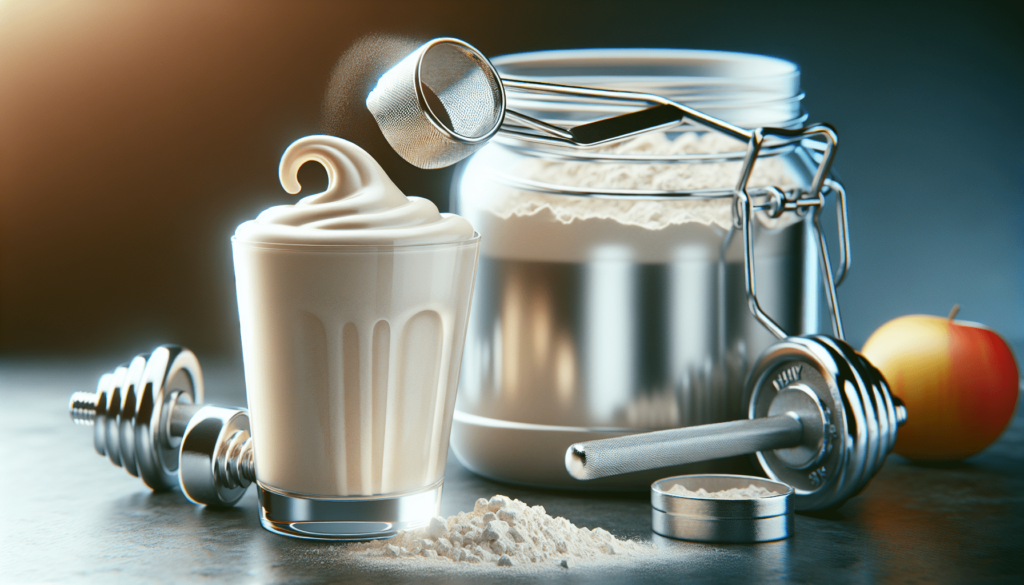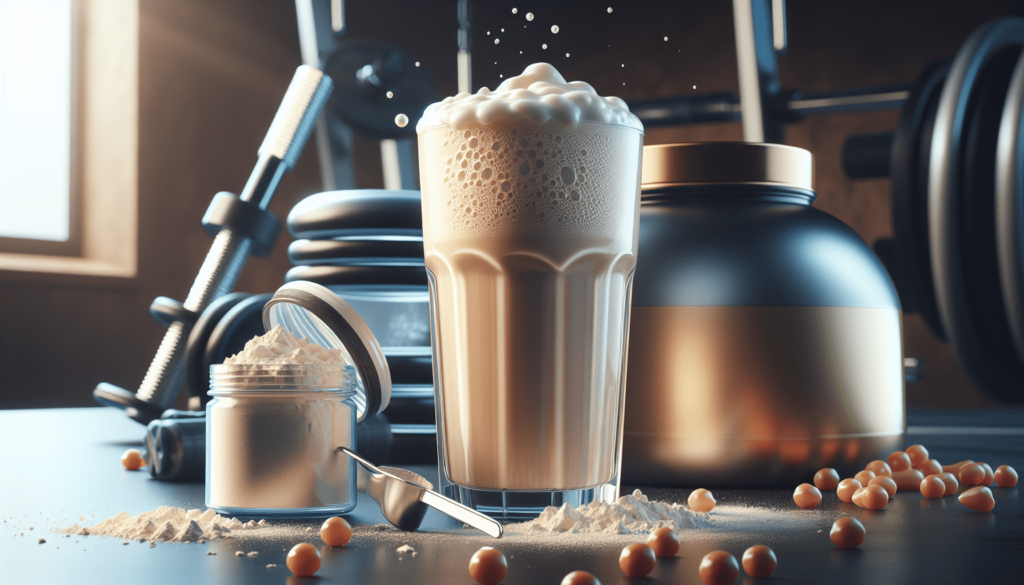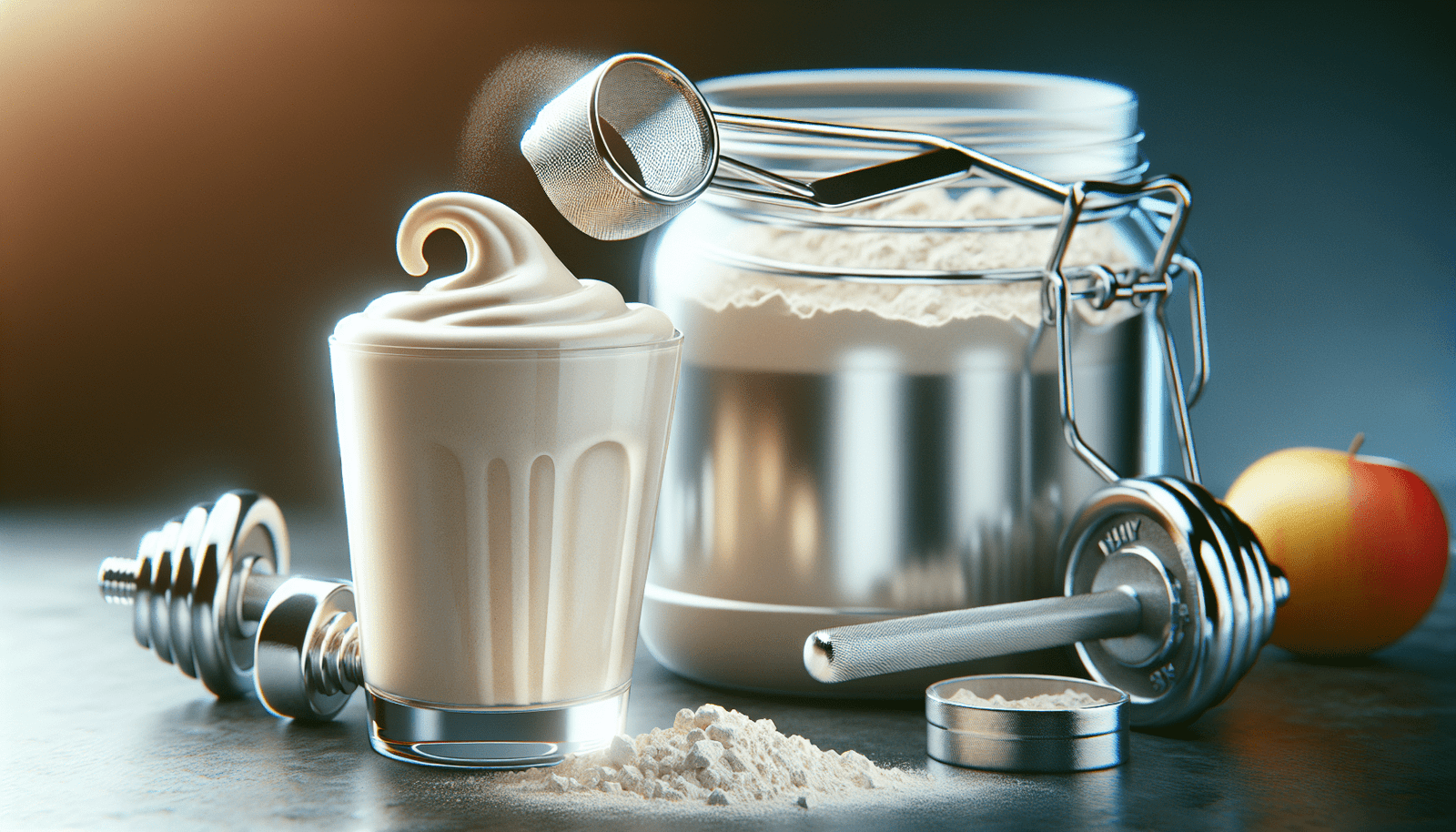Looking to achieve your health and fitness goals? Look no further than whey protein! Packed with essential amino acids, this popular supplement has become a favorite among athletes and fitness enthusiasts worldwide. In this article, we will explore the benefits and drawbacks of whey protein, providing you with the necessary information to make an informed decision on whether to incorporate it into your lifestyle. Get ready to uncover how whey protein can support muscle growth, aid in weight management, and enhance recovery, while also examining potential side effects and considerations. Whether you’re a seasoned gym-goer or just starting your fitness journey, whey protein might just be the secret ingredient you’ve been searching for!

Benefits of Whey Protein
Increased Muscle Mass and Strength
Consuming whey protein can have a positive impact on muscle mass and strength. Whey protein is rich in essential amino acids, which are the building blocks of muscle tissue. These amino acids are readily absorbed by the body and can stimulate muscle protein synthesis, leading to increased muscle mass. In addition, whey protein contains a high concentration of the amino acid leucine, which plays a crucial role in stimulating muscle protein synthesis and promoting muscle growth.
Enhanced Recovery and Reduced Muscle Soreness
After intense exercise, the body needs to repair and recover. Whey protein can aid in this process by providing the necessary amino acids to support muscle recovery. It helps to reduce muscle soreness and inflammation, allowing you to bounce back faster from your workouts. By consuming whey protein after your training sessions, you can enhance your recovery and get back to your next workout feeling fresher and stronger.
Rich Source of Essential Amino Acids
Whey protein is considered a complete protein because it contains all nine essential amino acids that the body cannot produce on its own. These essential amino acids are crucial for various physiological functions such as muscle repair, immune function, and hormone synthesis. By including whey protein in your diet, you ensure that your body receives an adequate supply of these essential nutrients.
Helps with Weight Management
If you’re looking to manage your weight, whey protein can be a valuable tool. It is highly satiating, meaning it helps you feel full and satisfied after consumption. By incorporating whey protein into your meals or snacks, you can potentially reduce your calorie intake by curbing hunger cravings. Additionally, whey protein can help preserve lean muscle mass during a calorie deficit, which is crucial for maintaining a healthy metabolism.
Supports Immune Function
The immune system is responsible for protecting the body against harmful pathogens and infections. Whey protein contains immunoglobulins, lactoferrin, and other bioactive compounds that can enhance immune function. These components help strengthen the body’s defense mechanisms, making you more resilient to illnesses. By incorporating whey protein into your diet, you can give your immune system an extra boost.
Drawbacks of Whey Protein
Potential Digestive Issues
While whey protein is a popular supplement, it can cause digestive issues in some individuals. Some people may experience bloating, gas, or an upset stomach after consuming whey protein. This is often due to lactose intolerance or sensitivity to dairy products. If you have a known sensitivity or allergy to dairy, it is important to choose a whey protein that is lactose-free or consider alternative protein sources.
Allergies and Sensitivities
Whey protein is derived from milk, making it a potential allergen for individuals with milk allergies. Allergic reactions to whey protein can range from mild symptoms, such as hives or itching, to more severe reactions like difficulty breathing or anaphylaxis. It is crucial to be aware of any allergies or sensitivities to milk before incorporating whey protein into your diet. If you have known allergies, it is recommended to consult with a healthcare professional before consuming whey protein.
Concerns with High Protein Intake
While protein is essential for building and repairing tissues, consuming excessive amounts of protein, including whey protein, may have its drawbacks. High protein intake can put strain on the kidneys and potentially lead to kidney complications, particularly in individuals with pre-existing kidney issues. It is important to consume whey protein within the recommended dosage and consult a healthcare professional if you have any underlying health conditions.
Quality and Safety Issues
The quality and safety of whey protein can vary depending on the manufacturer. Some protein supplements may be contaminated with heavy metals, additives, or low-quality protein sources. It is crucial to choose reputable brands that have undergone third-party testing to ensure product quality and safety. Reading labels and looking for certifications such as NSF Certified for Sport or Informed-Sport can help you make an informed decision.
Different Types of Whey Protein
Whey Protein Concentrate (WPC)
Whey protein concentrate is the most common and affordable form of whey protein. It is relatively low in fat and carbohydrates and contains varying levels of protein, typically ranging from 70% to 80%. WPC undergoes minimal processing, retaining most of the beneficial components found in whey. It is a versatile option that can be used for general protein supplementation or as a post-workout recovery drink.
Whey Protein Isolate (WPI)
Whey protein isolate is a more processed form of whey protein that undergoes additional filtration to remove most of the fat and lactose. As a result, WPI has a higher protein concentration (around 90% or more) compared to WPC. It is a suitable option for individuals who are lactose intolerant or looking for a product with minimal carbohydrates and fats. WPI is often considered the purest form of whey protein.
Whey Protein Hydrolysate (WPH)
Whey protein hydrolysate is the most rapidly absorbed form of whey protein due to its pre-digested state. It undergoes enzymatic hydrolysis, which breaks down the protein into smaller peptides, making it easier for the body to absorb and utilize. This form of whey protein is often recommended for individuals with digestive issues or those who require fast-acting protein, such as immediately post-workout.

Choosing the Right Whey Protein
Consider Your Goals and Needs
Before selecting a whey protein, it is important to consider your specific goals and needs. If your primary goal is to build muscle and increase strength, a whey protein isolate or hydrolysate with higher protein content may be more suitable. On the other hand, if you are looking for a cost-effective option and do not have any dietary restrictions, a whey protein concentrate can be a good choice. Understanding your goals will help you determine which type of whey protein aligns with your needs.
Read Labels and Look for Quality Certifications
When choosing a whey protein supplement, it is crucial to read the labels and understand the ingredients. Look for products that have undergone third-party testing to ensure quality and safety. Certifications such as NSF Certified for Sport or Informed-Sport indicate that the product has been tested for banned substances and has met rigorous quality standards. Checking for these certifications can give you confidence in the product you are purchasing.
Check for Any Allergens or Sensitivities
If you have any known allergies or sensitivities, it is essential to carefully check the ingredient list for potential allergens. Whey protein is derived from milk, making it unsuitable for individuals with dairy allergies. Look for lactose-free options or consider alternative protein sources if you have lactose intolerance. If you are unsure about any ingredients, it is recommended to consult with a healthcare professional.
Consider Taste and Mixability
Taste and mixability can greatly impact your overall experience with whey protein. While taste preferences can vary from person to person, reading reviews and trying samples can give you an idea of the flavor profile. Additionally, consider the mixability of the protein powder. Look for products that mix well with your preferred liquid of choice, whether it’s water, milk, or plant-based alternatives. Finding a protein powder that tastes good and mixes smoothly can make your supplementation routine more enjoyable.
Recommended Dosage of Whey Protein
Varies by Individual and Goals
The recommended dosage of whey protein can vary depending on individual factors such as body weight, activity level, and specific goals. As a general guideline, the American Dietetic Association suggests a protein intake of 0.8 grams per kilogram of body weight per day for sedentary individuals. However, for athletes and active individuals looking to support muscle growth and recovery, higher protein intake may be beneficial. It is recommended to consult with a healthcare professional or a registered dietitian to determine the appropriate dosage for your specific needs.
General Guidelines for Athletes and Active Individuals
For athletes and active individuals, the general guideline is to consume 1.2 to 2 grams of protein per kilogram of body weight per day. This range ensures an adequate supply of amino acids to support muscle protein synthesis and recovery. It can be beneficial to distribute your protein intake evenly throughout the day, including whey protein as part of your post-workout nutrition and in between meals for optimal muscle protein synthesis.
Consult a Healthcare Professional for Personalized Advice
If you have any pre-existing health conditions or concerns, it is crucial to seek personalized advice from a healthcare professional before starting any supplementation. They can assess your specific needs, consider any medications you may be taking, and provide guidance on the appropriate dosage and timing of whey protein consumption. Working with a healthcare professional ensures that you make informed decisions about your nutrition and supplementation.
When to Take Whey Protein
Pre-Workout
Consuming whey protein before a workout can provide your muscles with a readily available source of amino acids during exercise. This can help prevent muscle breakdown and enhance muscle protein synthesis. Aim to consume a serving of whey protein approximately 30 to 60 minutes before your workout to maximize its benefits. Pair it with a carbohydrate source for optimal energy levels and performance.
Post-Workout
Post-workout nutrition is crucial for muscle recovery and growth. Whey protein is rapidly absorbed by the body, making it an ideal choice for immediate post-workout consumption. Consuming whey protein post-workout can stimulate muscle protein synthesis, reduce muscle breakdown, and support muscle repair and growth. Aim to consume a serving of whey protein within 30 to 60 minutes after your workout for optimal recovery.
Between Meals
Incorporating whey protein between meals can help you meet your daily protein needs and maintain an anabolic state throughout the day. When consumed between meals, whey protein provides a steady supply of amino acids to support muscle protein synthesis. This can be especially beneficial for individuals looking to build or maintain lean muscle mass. Consider having a whey protein shake or adding protein powder to smoothies or yogurt as a convenient snack option.
As a Meal Replacement
In some cases, whey protein can be used as a meal replacement for individuals looking to manage their calorie intake or enhance weight loss. However, it is important to note that whole foods should form the foundation of a healthy diet. Whey protein should not replace a well-balanced meal that provides a variety of nutrients. If you choose to use whey protein as a meal replacement, consider adding fruits, vegetables, and healthy fats to ensure you’re getting a balanced nutritional profile.
Side Effects of Whey Protein
Digestive Issues
One of the common side effects of whey protein consumption is digestive issues. Some individuals may experience bloating, gas, or an upset stomach. These symptoms are often due to lactose intolerance, sensitivity to dairy, or an overconsumption of protein. It is important to start with a smaller dosage and gradually increase it to allow your body to adjust. If digestive issues persist, consider switching to a lactose-free whey protein or exploring alternative protein sources.
Kidney Complications
There is a misconception that high protein intake, including whey protein, can lead to kidney damage or complications. However, research suggests that in healthy individuals without pre-existing kidney issues, moderate protein intake is generally safe and does not pose a risk. If you have any concerns or pre-existing kidney conditions, it is recommended to consult with a healthcare professional before increasing your protein intake.
Acne and Skin Problems
Some individuals may experience acne breakouts or skin problems when consuming whey protein. This is thought to be due to the insulinotropic effects of whey protein, which can increase insulin levels in the body. Elevated insulin levels can stimulate sebum production and potentially contribute to acne development. If you notice any skin issues after consuming whey protein, consider reducing your dosage or switching to an alternative protein source.
Increased Risk of Gout
Individuals with a history of gout or high uric acid levels may be more susceptible to gout flare-ups when consuming whey protein. Whey protein is rich in purines, which are metabolized into uric acid in the body. Elevated uric acid levels can lead to the formation of uric acid crystals in the joints, causing gout. If you have a history of gout, it is recommended to limit your purine intake and consult with a healthcare professional before consuming whey protein.
Interactions with Medications
Whey protein, like any dietary supplement, may interact with certain medications. It is important to be aware of potential interactions if you are taking medications for any health condition. Some medications, such as antibiotics or certain blood pressure medications, may interact with whey protein. It is recommended to consult with your healthcare professional or pharmacist to ensure that there are no potential interactions between your medications and whey protein supplementation.
Whey Protein and Weight Loss
Increased Satiety and Reduced Appetite
Whey protein has been shown to have a satiating effect, meaning it can help curb hunger cravings and reduce appetite. This can be particularly beneficial for individuals looking to manage their weight or reduce calorie intake. By promoting feelings of fullness, whey protein can help you control your portion sizes and make healthier food choices, ultimately aiding in weight loss efforts.
Preservation of Lean Muscle Mass
During periods of calorie restriction or weight loss, there is a risk of losing muscle mass along with fat. Whey protein can help mitigate this loss by providing the essential amino acids necessary to support muscle protein synthesis. By preserving lean muscle mass, you can maintain a higher metabolic rate, which can aid in weight loss and prevent weight regain.
Enhanced Fat Burning
Whey protein has been shown to enhance fat burning in several ways. Firstly, it has a thermogenic effect, meaning it can increase the body’s energy expenditure and fat oxidation. Secondly, whey protein’s high leucine content plays a role in regulating muscle protein synthesis, which can indirectly promote fat loss. By incorporating whey protein into your weight loss regimen, you can potentially enhance your body’s ability to burn fat.
Whey Protein and Muscle Building
Increased Muscle Protein Synthesis
Whey protein is well-known for its ability to stimulate muscle protein synthesis, the process responsible for building and repairing muscle tissue. The high concentration of essential amino acids, particularly leucine, in whey protein triggers muscle protein synthesis and promotes muscle growth. By consuming whey protein after resistance training or as part of your daily protein intake, you can maximize muscle protein synthesis and enhance muscle building.
Promotes Muscle Repair and Growth
Intense exercise places stress on the muscles, leading to microscopic damage. Whey protein provides the necessary amino acids for muscle repair and growth. By consuming whey protein post-workout, you can expedite the recovery process and support muscle repair. This enables you to recover faster and experience greater gains in muscle size and strength over time.
Enhances Recovery
Muscle recovery is crucial for optimal performance and progress. Whey protein’s rapid absorption rate and high amino acid content make it an ideal choice for post-workout nutrition. By consuming whey protein after exercise, you can replenish glycogen stores, reduce muscle damage, and enhance recovery. This allows you to train more frequently and at higher intensity, ultimately leading to better results in terms of muscle building and strength gains.
Conclusion
Whey protein offers numerous benefits for athletes and active individuals. From increased muscle mass and strength to enhanced recovery and reduced muscle soreness, whey protein can significantly contribute to your fitness journey. However, it is important to consider potential drawbacks and make informed decisions. Digestive issues, allergies, concerns with high protein intake, and quality and safety issues should be taken into account. Additionally, choosing the right type of whey protein based on your goals, reading labels, checking for allergens or sensitivities, and considering taste and mixability are important factors. Keep in mind the recommended dosage and the appropriate timing for consuming whey protein, as well as the potential side effects. Whey protein can play a role in weight management and muscle building by increasing satiety, preserving lean muscle mass, and enhancing fat burning. Ultimately, consult with a healthcare professional before starting any supplementation to ensure it aligns with your individual needs and goals. With the right approach, whey protein can be a valuable tool in supporting your fitness and nutrition goals.

